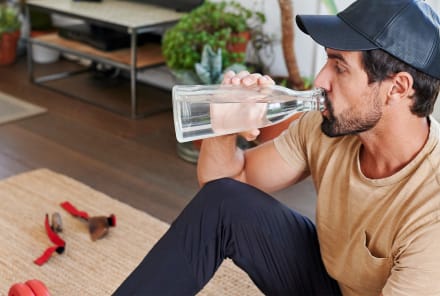Advertisement
The 3 Best Things You Can Do For Your Brain, From A Neurophysiologist


Maintaining a healthy brain doesn't need to be complicated. Sure, you can learn various brain teasers, games, and whatnot, but the best things you can do for your brain are actually way more simple.
On an episode of the mindbodygreen podcast, neurophysiologist Louisa Nicola, founder of Neuro Athletics, shares three basic principles you should prioritize for a healthier brain. Below a quick summary:
Sleep
"First of all, I think sleep is the most underrated high-performance tool we have," Nicola states. "It's like a sewage system or a dishwasher, if you will. It washes all of the debris and junk that accumulates during the day."
If you don't get enough sleep, your brain cannot clear out that debris, and those toxins can start to build up. "One of the proteins that builds up is amyloid beta—this is a protein that is one of the hallmarks of Alzheimer's1," Nicola notes.
She then explains that you should take both quantity and into account. After all, a full eight or nine hours of sleep isn't always possible, but it's more about the quality of the hours you do get. That's why Nicola recommends setting a consistent bed- and wake time, dimming the lights as you wind down (since blue light messes with your natural melatonin production), and making sure your bedroom stays cool enough. Here, you can find more expert-backed tips to catch quality Zzz's.
And while sleep trackers can be helpful, they're not essential for securing high-quality sleep. "Ultimately, you should just focus on how you're feeling when you sleep [and] when you wake up in the morning," she adds.
Exercise
Now, for the equally important half of the equation: exercise. Any movement is beneficial for neurological health; however, Nicola does praise aerobic exercise and resistance training for optimal brain aging.
Aerobic exercise has also been shown to generate new neurons in the hippocampus2, or the region of the brain associated with memory, learning, and emotions.
"They go up to the blood-brain barrier, and they have an effect on different areas of our brain," Nicola shares. And some of these myokines have been shown to have neuroprotective properties4.
Not sure how often is often enough? Nicola recommends getting at least 20 minutes of aerobic exercise per day and resistance training three times a week.
"You want to do around five exercises per muscle," she explains. If you need some workout inspiration, feel free to check out our full strength training guide.
Supplements
Think of sleep and exercise as your brain health basics. Then if you want to go the extra mile, you can supplement. Nicola says that creatine and EPA/DHA (two derivatives of omega-3 fatty acids) are the most important for brain health.
"I am advocating for everyone to supplement with omega-3 fatty acids, specifically EPA and DHA," Nicola says, as these forms help with cell membrane fluidity and overall brain health. You can find our favorite omega-3 supplements here.
As for creatine, recent research looks promising: According to a 2021 review study on creatine supplementation and brain health5, consuming the amino acid is associated with improved cognition. Another 2018 review6 found supplementing with creatine could improve short-term memory and intelligence and reasoning.
You can also opt for a brain and memory supplement, if you'd like to get specific. Regardless of which supplement you choose, "Supplement quality is by far the first thing that you need to consider," Nicola notes. She explains that sourcing and dosage are important, so don't invest in just any product you see.
Not sure where to find a trusty option? Start here with a carefully curated list of the best brain supplements on the market, all recommended by nutrition Ph.D.
The takeaway
If you want to support your brain health, pay attention to the basics: Prioritize quality and consistent sleep, exercise often, and take a brain health supplement if you'd like an extra boost. Simple!
6 Sources
- https://www.ncbi.nlm.nih.gov/pmc/articles/PMC2813509/
- https://www.ncbi.nlm.nih.gov/pmc/articles/PMC5808288/
- https://www.ncbi.nlm.nih.gov/pmc/articles/PMC8998961/
- https://www.frontiersin.org/articles/10.3389/fnagi.2021.649929/full
- https://www.ncbi.nlm.nih.gov/pmc/articles/PMC7916590/
- https://www.ncbi.nlm.nih.gov/pmc/articles/PMC6093191/
Watch Next
Enjoy some of our favorite clips from classes
Enjoy some of our favorite clips from classes
What Is Meditation?
Mindfulness/Spirituality | Light Watkins
Box Breathing
Mindfulness/Spirituality | Gwen Dittmar
What Breathwork Can Address
Mindfulness/Spirituality | Gwen Dittmar
The 8 Limbs of Yoga - What is Asana?
Yoga | Caley Alyssa
Two Standing Postures to Open Up Tight Hips
Yoga | Caley Alyssa
How Plants Can Optimize Athletic Performance
Nutrition | Rich Roll
What to Eat Before a Workout
Nutrition | Rich Roll
How Ayurveda Helps Us Navigate Modern Life
Nutrition | Sahara Rose
Messages About Love & Relationships
Love & Relationships | Esther Perel
Love Languages
Love & Relationships | Esther Perel
What Is Meditation?
Box Breathing
What Breathwork Can Address
The 8 Limbs of Yoga - What is Asana?
Two Standing Postures to Open Up Tight Hips
How Plants Can Optimize Athletic Performance
What to Eat Before a Workout
How Ayurveda Helps Us Navigate Modern Life
Messages About Love & Relationships
Love Languages
Advertisement

Yes, There's A Longevity Vitamin (& People Over 40 Need To Prioritize It)
Molly Knudsen, M.S., RDN

Study Investigates How Fasting Impacts Sleep, Hormone Health & More
Gretchen Lidicker, M.S.

Yes, There's A Longevity Vitamin (& People Over 40 Need To Prioritize It)
Molly Knudsen, M.S., RDN

Study Investigates How Fasting Impacts Sleep, Hormone Health & More
Gretchen Lidicker, M.S.

Yes, There's A Longevity Vitamin (& People Over 40 Need To Prioritize It)
Molly Knudsen, M.S., RDN

Study Investigates How Fasting Impacts Sleep, Hormone Health & More
Gretchen Lidicker, M.S.

Yes, There's A Longevity Vitamin (& People Over 40 Need To Prioritize It)
Molly Knudsen, M.S., RDN

Study Investigates How Fasting Impacts Sleep, Hormone Health & More
Gretchen Lidicker, M.S.














